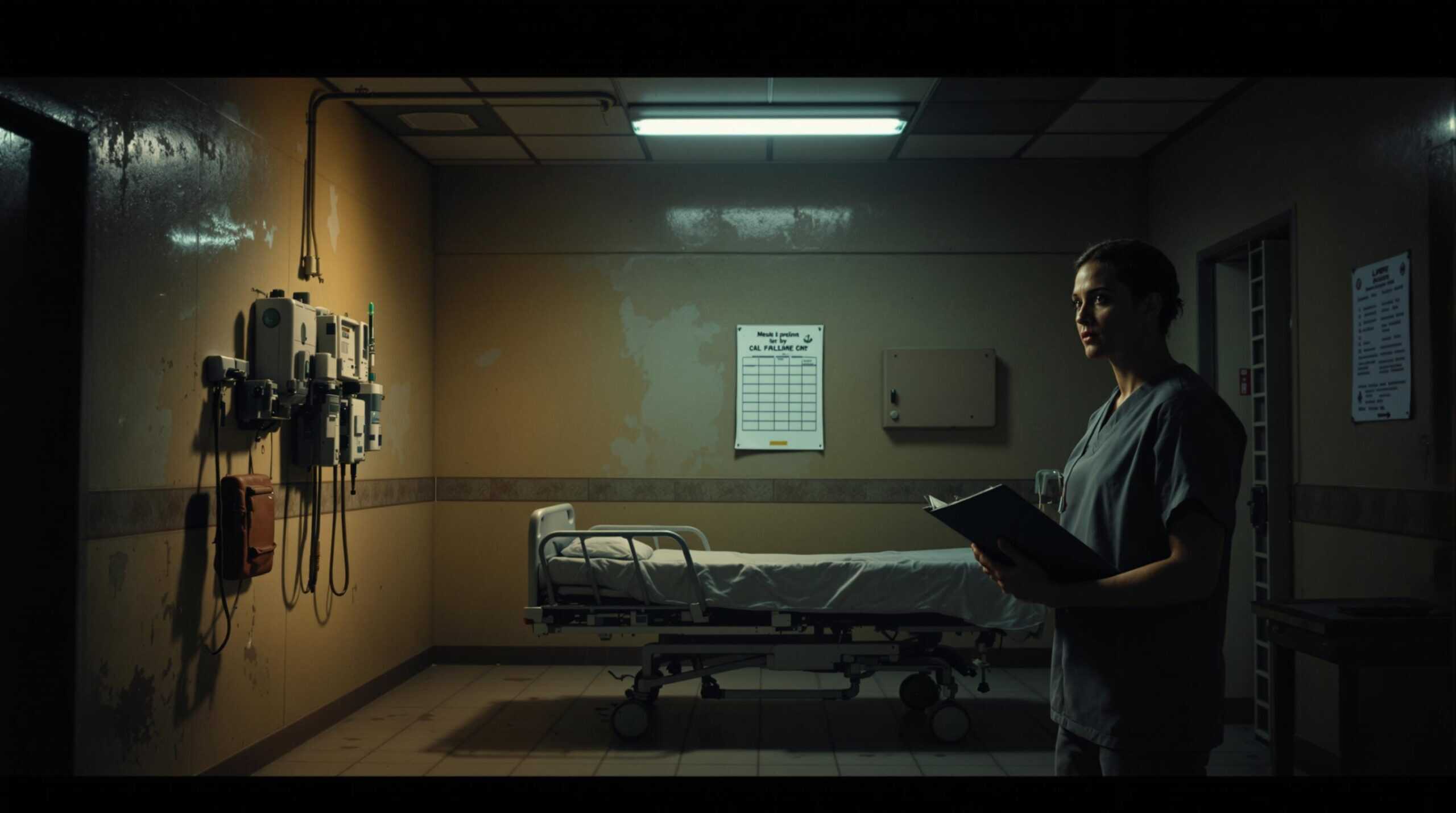Delays in medical care within Georgia’s prisons are caused by three main problems: chronic understaffing, ineffective policies, and poor resource management. These failures harm inmates’ health and violate legal rights. Here’s a quick summary:
- Budget Shortfalls: A $65 million gap in 2023 led to staff shortages and canceled appointments.
- Administrative Barriers: Complex rules delay treatments, with approval processes taking up to 78 days.
- Legal Violations: Inmates face 10-month psychiatric care waits, breaching Eighth Amendment protections.
- Chronic Illness Neglect: Hepatitis C and HIV treatments are delayed by months, affecting only 10% of those in need.
Quick Overview of Key Problems
| Problem | Impact |
|---|---|
| Budget Cuts | Staff shortages, canceled appointments |
| Policy Barriers | 78-day average for specialist care |
| Chronic Illness Neglect | Only 10% of Hepatitis C patients treated |
| Legal Violations | 10-month wait for psychiatric care |
These systemic failures require urgent reforms to improve care and uphold inmates’ rights.
Georgia prison healthcare faces little independent oversight
Budget and Resource Problems
Budget issues are a major factor behind treatment delays, impacting healthcare delivery in several ways:
Healthcare Budget Shortfalls
Understaffing caused by budget cuts often results in canceled medical appointments, delaying critical treatments. For example, prisoners like Gus have faced months-long delays for Hepatitis C treatment. Repeated appointment cancellations – spanning nearly a year – were directly tied to a lack of medical personnel [1].
Problems with Private Healthcare Providers
Privatized healthcare has added to the challenges, creating inefficiencies and higher costs:
| Issue | Consequence |
|---|---|
| Trauma & Assault Care | Over $30 million spent annually on more than 1,000 non-fatal assault cases [5] |
| Staffing Reimbursements | Delayed payments disrupting consistent care delivery [5] |
In 2023, Wellpath terminated its contract after struggling to control expenses [5]. With an aging prison population and rising cases of chronic illnesses, the system remains underfunded and overwhelmed [5].
These financial pressures set the stage for the administrative barriers discussed in the next section.
Process and Policy Roadblocks
In Georgia prisons, administrative procedures and policies often delay medical care, creating a system where following the rules takes priority over addressing urgent health needs. This bureaucratic approach frequently leads to dangerous treatment delays.
Medical Transfer Rules
There’s a glaring gap between what policies promise and what actually happens. The Georgia Department of Corrections (GDC) officially claims that medical needs guide transfer decisions, but the reality is far different. According to GPS reports, 22 medical transfer requests were denied in 2023 simply because the treatments were considered too complex [1].
| Policy vs. Practice Comparison | Written Policy | Actual Implementation |
|---|---|---|
| Transfer Eligibility | Based on disability level | Based on treatment complexity |
| Treatment Continuation | Should be accommodated | Often denied at new facilities |
| Medical Need Priority | Primary consideration | Secondary to administrative convenience |
Slow Approval Steps
The approval process for medical care is bogged down by unnecessary layers, causing significant delays. Here’s how the current system works:
| Approval Stage | Decision Maker | Average Time |
|---|---|---|
| Initial Review | Health Services Administrator | 14-21 days |
| Secondary Review | Deputy Warden | Additional 21-30 days |
| Final Authorization | Inmate Health Director | 30+ days |
These delays only add to the issues caused by staffing shortages, creating a cycle of failure. For example, a report from Wellpath revealed alarming statistics about delays in specialist care [5]:
- 42 days: Average wait time for oncology consultations (compared to a 14-day national average for prisons)
- 78 days: Average wait for infectious disease referrals
- 93%: Percentage of prior authorization requests requiring resubmission due to paperwork errors
"The current processes violate ADA requirements by delaying reasonable accommodations", says Emily Shelton of Ignite Justice, emphasizing how deeply these delays are embedded in the system [1][6].
Georgia’s reliance on Medicaid criteria adds another 3-5 weeks to the approval timeline, compared to states with prison-specific protocols [5][7]. Clinicians have also reported that administrators override 38% of urgent transfer requests [1]. To make matters worse, inmates are required to appeal to the same officials who caused the delays in the first place [4][6], locking them in a frustrating cycle with no clear resolution.
These administrative failures not only harm inmates but also expose the system to legal challenges, which will be discussed in the next section on rights violations.
sbb-itb-7858f51
Legal Rights and Violations
The Eighth Amendment guarantees prisoners the right to medical care, but these protections often clash with budget constraints and policy issues. In Estelle v. Gamble (1976), the Supreme Court ruled that "deliberate indifference" to serious medical needs is a constitutional violation [1]. Georgia has also been found to regularly breach ADA requirements by delaying disability accommodations [3].
| Legal Requirement | Georgia’s Performance |
|---|---|
| Timely Psychiatric Care | Average wait of 10 months |
| Specialist Referrals | Average delay of 78 days |
| Emergency Care Access | Inconsistent response times |
| Medication Continuity | Frequent interruptions |
Rights Violation Examples
A 2022 DOJ investigation revealed widespread Eighth Amendment violations:
"The current system has resulted in a pattern of deliberate indifference that regularly puts inmates’ lives at risk", according to the DOJ report. The report emphasized that staffing shortages have caused dangerous delays in treatment [8].
One of the most alarming issues is the 10-month average wait for psychiatric care, including competency treatment, which far exceeds constitutional limits [8].
These ongoing violations not only worsen inmates’ health but also expose the state to increasing legal challenges. This systemic neglect directly ties into the chronic disease care failures discussed in the following section.
Long-term Illness Care Gaps
Chronic conditions, like Hepatitis C and HIV, face some of the worst treatment delays. These delays stem from bureaucratic hurdles and limited resources, as previously discussed.
Hepatitis C and HIV Care Delays
For prisoners with Hepatitis C, the numbers paint a grim picture: only 10% receive the treatment they need, even though effective medications are available [1]. The wait times for care are alarming:
| Treatment Stage | Average Wait Time |
|---|---|
| Initial Testing | 18 months |
| Treatment Initiation | 6-12 months |
In Georgia, new HIV diagnoses are the highest in the nation (24.9 per 100,000). Back in 2019, there were 3,846 HIV-positive prisoners reported. Delays in starting antiretroviral therapy (ART) have led to increased viral loads and faster disease progression [2]. These delays reflect systemic issues in the approval process.
"The current system has created a dangerous environment where treatment delays of 3-6 months in initiating ART can significantly impact long-term health outcomes, leading to rapid decline in CD4 cell counts and progression to AIDS", stated a 2023 CDC assessment [3].
Medical Standards Review
Georgia’s prison system shows a troubling gap between required medical standards and actual practice. This discrepancy undermines the Georgia Department of Corrections’ (GDC) claims about transfer eligibility policies previously analyzed. The American Correctional Association (ACA) provides clear guidelines for managing chronic diseases, but Georgia consistently falls short.
Here’s how Georgia measures up to ACA benchmarks:
| ACA Requirement | Georgia’s Implementation Status |
|---|---|
| 14-day Initial Health Screening | Generally Met |
| Regular Chronic Care Clinics | Severely Understaffed |
| Specialist Care Access | Extended Delays |
| Health Education Programs | Limited Availability |
A September 2023 lawsuit by the Southern Center for Human Rights emphasized the failure, noting that "only about 1% of infected prisoners receive treatment for Hepatitis C, despite the availability of highly effective medications" [1].
This neglect prioritizes emergencies over chronic care, worsening untreated conditions. These failures not only escalate costs but also violate the Eighth Amendment, as discussed in earlier sections on legal rights.
Reform Work and Barriers
Efforts to address systemic failures in prison medical care have led to reform initiatives, but these face stiff resistance. Advocacy groups are up against the same systemic issues that cause treatment delays in the first place.
Georgia Prisoners’ Speak Actions

Georgia Prisoners’ Speak (GPS) plays a critical role in highlighting problems with medical care in Georgia’s prison system. Through detailed tracking of cases and collaboration with legal networks, they shed light on the widespread delays in treatment [1].
| Activity | Impact |
|---|---|
| Documented neglect cases | Over 120 cases recorded |
| Legal support connections | 45 inmates assisted |
| Media stories generated | 15 stories published |
GPS works to expose these care gaps by teaming up with groups like the Southern Center for Human Rights and The Human and Civil Rights Coalition of Georgia to amplify their findings [1].
"Our documentation forces accountability discussions at the state level", a GPS representative stated in December 2023 [1].
Reform Opposition
The Georgia Department of Corrections (GDC) has been slow to engage with proposals from advocacy groups [10]. Private healthcare providers contracted by the prison system also bring challenges, as their contractual obligations sometimes clash with the reforms being suggested [9].
Major obstacles include:
- A high turnover rate among medical staff (45%)
- Insufficient funding for reforms
- Political resistance to change
Another significant hurdle is the fear of retaliation. Prisoners who report inadequate medical care often face potential consequences. To counter this, GPS has introduced anonymous reporting systems to protect individuals while continuing their advocacy efforts [1].
These challenges echo earlier administrative failures, creating a cycle of systemic issues. Despite these difficulties, advocacy groups remain committed to driving change.
Conclusion
Delays in Georgia’s prison medical care can be traced back to three major issues: chronic underfunding, flawed policies, and systemic rights violations. These problems feed into one another – budget cuts lead to staffing shortages, which then create policy bottlenecks, ultimately resulting in legal and medical failures. Examples like the prolonged delays in hepatitis C treatments and psychiatric care highlight these interconnected challenges.
Staffing gaps and evaluation delays – such as the 10-month wait times for psychiatric care [8] – show how insufficient funding directly causes treatment setbacks. Additionally, the recurring costs tied to trauma care [5] point to the need for a different approach to resource allocation.
Cases of denied transfers and delayed treatments underline a troubling pattern: procedural rules often take precedence over urgent medical needs. The evidence discussed in this article demonstrates how these systemic issues continue to harm the health of incarcerated individuals. Addressing these failures requires coordinated action and structural changes from state decision-makers.

1 thought on “Delays in Georgia Prison Medical Care: Causes”